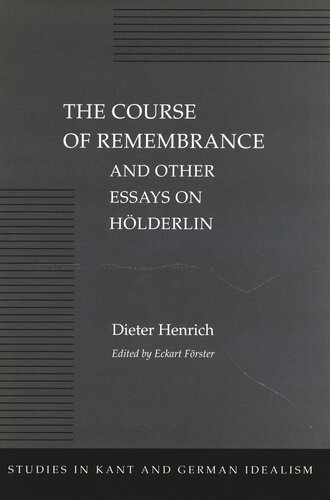

Most ebook files are in PDF format, so you can easily read them using various software such as Foxit Reader or directly on the Google Chrome browser.
Some ebook files are released by publishers in other formats such as .awz, .mobi, .epub, .fb2, etc. You may need to install specific software to read these formats on mobile/PC, such as Calibre.
Please read the tutorial at this link: https://ebookbell.com/faq
We offer FREE conversion to the popular formats you request; however, this may take some time. Therefore, right after payment, please email us, and we will try to provide the service as quickly as possible.
For some exceptional file formats or broken links (if any), please refrain from opening any disputes. Instead, email us first, and we will try to assist within a maximum of 6 hours.
EbookBell Team

4.0
36 reviewsFriedrich Hölderlin (1770-1843) has long been recognized as one of the greatest poets of the German language, but his importance to philosophy has surfaced only comparatively recently. Although Schelling and Hegel acknowledged Hölderlin early on as their equal, for a long time his philosophical thought remained unknown outside the small circle of his friends. Among the most prominent figures in the rediscovery of Hölderlin's thought is Dieter Henrich, who, in a series of highly influential studies over the last thirty years, has shown that Hölderlin played a decisive role in the development of philosophy from Kant to Hegel, and hence in the formation of German Idealism. Among other things, Henrich demonstrated that Hölderlin, while still a student, launched a powerful critique of Fichte's Wissenschaftslehre and outlined an alternative to the dominant view of the foundation of philosophy. This alternative proved pathbreaking for his philosophical friends, forcing Hegel, for example, to abandon his own Kantianism and, eventually, to give systematic articulation to a position that went even beyond Hölderlin's. This volume includes six of Henrich's most important essays on Hölderlin's philosophical significance. Among the topics discussed are Hölderlin's motivation and methodological orientation in his work on German Idealism, the intellectual atmosphere of Hölderlin's student years and the philosophical problems that occupied him, Hölderlin's attitude toward any first-principle philosophy, and the complex personal and philosophical relationships between Hegel and Hölderlin. The last essay is a long, detailed interpretation of one of Hölderlin's greatest poems, "Remembrance." In elucidating its lyric composition and structure, Henrich also seeks to show how it incorporates and develops Hölderlin's philosophical thought.